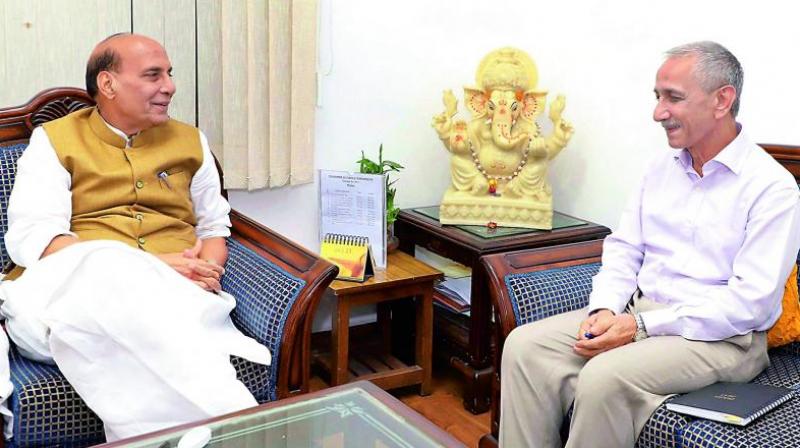Interlocutor's first job: Start listening to J&K
Dineshwar Sharma, the former Intelligence Bureau director was appointed as the Centre's interlocutor for Jammu and Kashmir.

Dineshwar Sharma, the former Intelligence Bureau director who was appointed as the Centre’s interlocutor for Jammu and Kashmir earlier this week, has taken up a task in which three such previous attempts have failed. Since 2001, K.C. Pant, N.N. Vohra and the trio of Dileep Padgaonkar, Radha Kumar and M.M. Ansari have acted as interlocutors at various times. None of those efforts were, however, taken to their logical conclusion. Mr Sharma, who retired as IB chief in December 2016, is surely aware of the challenges that will confront him as he attempts to reach out to a wider section of the Kashmiri population, particularly the youth. His background and expertise — of working quietly away from the limelight — is likely to work to Mr Sharma’s advantage. Perhaps one of the main reasons to appoint a career intelligence officer rather than a public figure as the interlocutor was to keep the effort low profile without expecting dramatic breakthroughs. After all, Kashmir has eluded a satisfactory solution for decades.
What then should one expect from the Centre’s new initiative? And more important, what prompted the Narendra Modi government to appoint an interlocutor at this stage? The answer to the first question is: it’s too early to look at the outcome. By Mr Sharma’s own admission, he will first visit the state and talk to various stakeholders before making up his mind on the approach he should adopt. The government too has made it clear that the interlocutor has been appointed to carry out a “sustained” dialogue. The government press note that announced. Mr Sharma’s appointment speaks of “a dialogue with elected representatives, various organisations and concerned individuals in the State of Jammu and Kashmir”. Mr Sharma will initiate a “sustained interaction and dialogue to understand the legitimate aspirations of the wide cross-section of society, particularly the youth, in Jammu and Kashmir and communicate them to the state government and the Centre”, the press note added.
Although the government has not explicitly said Mr Sharma will talk to the separatists, he told the media that the Hurriyat — the collective of separatists — is also a stakeholder, and that there is no restriction on talking to anyone. That the new interlocutor, given the status of Cabinet Secretary, has an open mind is in itself a positive start. However, the crackdown by the National Investigation Agency against certain individuals linked to the Hurriyat for terror links and terror funding must not be diluted or allowed to slacken just because the government has decided to initiate a dialogue with all stakeholders. The two issues are distinct and should be treated as such, without letting one impact the other.
Similarly, the counter-intelligence and counter-terrorism operations against terrorists both on the Line of Control (LoC) with Pakistan and in the hinterland will have to continue apace. Army Chief Gen. Bipin Rawat has done well to clarify that operations by the security forces will not be affected by the appointment of the new interlocutor. The security forces in fact must be extra vigilant as Pakistan, which fancies itself as a J&K stakeholder, is likely to sabotage the Indian government’s new initiative.
As to the timing of the government’s decision, it is worth noting that the government has chosen to reach out to the people of J&K after getting the security situation under manageable control. Since July 2016, the Kashmir Valley was in turmoil and for some months it seemed as if the law and order and security situation was sliding back to the terrible days of the early 1990s. However, a focused and intelligence-driven counter-intelligence and counter-terrorist strategy for the past one year, has brought about a dramatic improvement in the on-ground situation. The exemplary synergy between the J&K police, the Army and the Central paramilitary forces has allowed the government the space to regain its position of strength.
That the Centre was looking at the “softer” approach was evident in August itself when Prime Minister Narendra Modi, speaking from the Red Fort on Independence Day, declared that “neither by bullet nor by abuses but only by an embrace we can solve the problem of Kashmir” (Na goli se na gali se baat banegi gale lagane se Kashmir ka masla suljhega). The PM’s declaration was followed up by home minister Rajnath Singh’s four-day visit to J&K in September.
Mr Singh’s extensive interaction with more than 80 delegations of various hues was confirmation of the Centre’s intention to reach out to the awam in J&K. A substantial financial package worth over Rs 80,000 crores meant for different infrastructure and development projects, is under implementation in the state, but J&K’s problem goes far beyond just financial needs. There is an emotional disconnect between the people of the state and the rest of India, thanks to an inconsistent approach to J&K’s fundamental issues.
Mr Sharma’s first job is to perhaps reach out to a cross-section of the people, understand the aspirations of the youth and suggest a way forward. Fortunately, the government has refrained from putting a deadline or spell out the desired outcome. At the same time, it would be wrong to frame the relationship between the people of J&K and the Government of India as adversarial. The state is an integral part of India. All its real and perceived grievances must therefore be settled within the existing mechanism. Which also means that no third party (read Pakistan) should have any role in what is essentially India’s internal matter, even if many in India and of course in Pakistan continue to harbour such hopes. The success or failure of the Centre’s decision to adopt the mechanism of an interlocutor for J&K will depend on the firmness it displays in staying the course even if there are some inevitable setbacks on the way.

